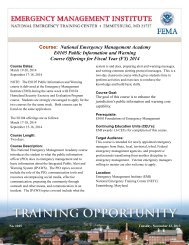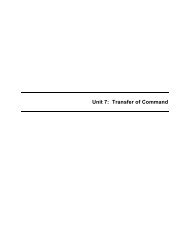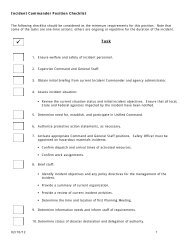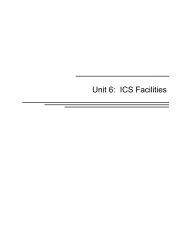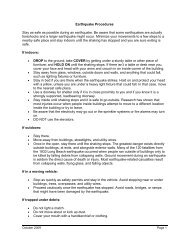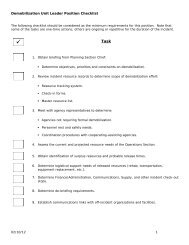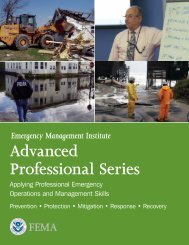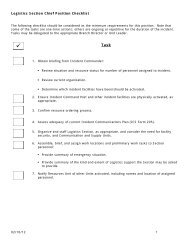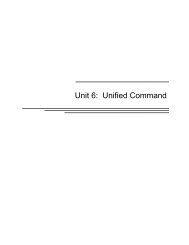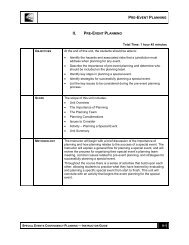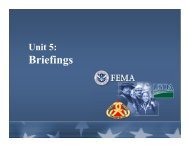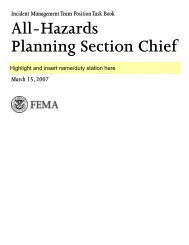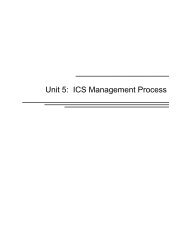Effective Communication - Emergency Management Institute ...
Effective Communication - Emergency Management Institute ...
Effective Communication - Emergency Management Institute ...
You also want an ePaper? Increase the reach of your titles
YUMPU automatically turns print PDFs into web optimized ePapers that Google loves.
UNIT 3: COMMUNICATING IN AN EMERGENCY<br />
page 2<br />
Job Aid 3.1<br />
Templates for Written <strong>Communication</strong>s (Continued)<br />
If any supports or portions of the foundation walls are missing or the ground has washed away,<br />
the floor is not safe.<br />
If you see obvious damage, have a building inspector check the house before you go in.<br />
Enter the building carefully: If the door sticks at the top it could mean the ceiling is ready to fall.<br />
If you force the door open, stand outside the doorway away from falling debris.<br />
AFTER ENTERING A BUILDING:<br />
Look before you step: The ground and floors are covered with debris including broken bottles<br />
and nails. Floors and stairs can be very slippery.<br />
Be alert for gas leaks: Do not strike a match or use an open flame when you enter a building<br />
unless you know the gas has been turned off and the area ventilated. Use a flashlight to<br />
inspect for damage.<br />
Turn off the electricity: Even if the power company has turned off electricity to the area, be sure<br />
to disconnect your house’s power supply. Do not use appliances or motors that have gotten wet<br />
unless they have been taken apart, cleaned and dried.<br />
Replace exposed wires: Electrical wires that have been exposed to salt water are recyclable<br />
junk and must be replaced.<br />
Watch for animals, especially snakes: Small animals that have been flooded out of their homes<br />
may seek shelter in yours. Use a stick to poke and turn items over and scare away small<br />
animals.<br />
Carbon monoxide exhaust kills: Use a generator or other gasoline-powered machine outdoors.<br />
The same goes for camping stoves. Charcoal fumes are deadly; cook with charcoal outdoors.<br />
Drain your basement carefully: Water in the ground puts pressure on your basement walls and<br />
floors. Drain the basement gradually to minimize further structural damage.<br />
Hose the house: Most of the health hazards brought by a flood are in the mud and silt that is<br />
left after the water drains away. Shovel out as much mud as possible and hose the house<br />
down, inside and out.<br />
Be aware of health hazards: Flood waters have picked up sewage and chemicals from roads,<br />
farms, factories, and storage buildings. Many flooded items, such as wallboard and mattresses,<br />
will hold mud and contamination forever. Spoiled food, flooded cosmetics and medicine are<br />
also health hazards. When in doubt, throw them out.<br />
#####<br />
<strong>Effective</strong> <strong>Communication</strong> Page 3.27



